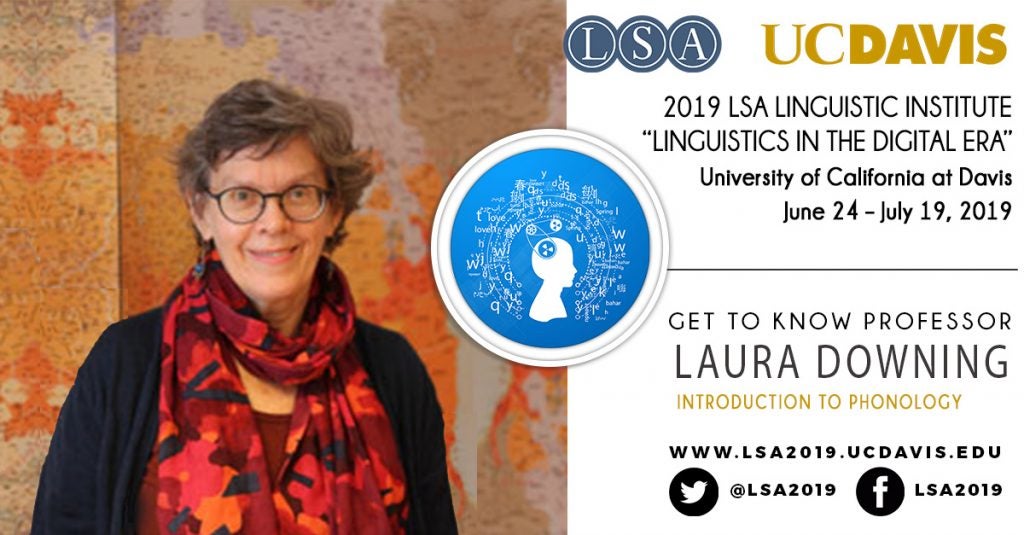
“Don’t fall in love with a particular theory or method. They change and the changes might break your heart… Fall in love with a language or language family or a theory-neutral phenomenon, and you’ll never run out of interesting questions to pursue.”
-Love advice from Laura Downing (U of Gothenburg, Sweden). Laura will teach the Introduction to Phonology course at #lingstitute2019. The course will highlight analytical issues related to segmental and autosegmental phenomena using a variety of languages, including understudied ones. Continue reading to learn more about Laura and houseplants.
1. Can you please tell us about your linguistic background?
I got my Ph.D from the University of Illinois at Urbana-Champaign in 1990. I began to identify myself as someone who would strive to combine research on theoretical phonology with research on understudied phenomena in, mainly, Bantu languages by the time I defended my dissertation, and I have continued on that path. After my dissertation, I held a series of temporary positions in North America and then moved to Europe in 2001 to become a research fellow at the ZAS (Center for General Linguistics) in Berlin. While there, I started going regularly to Malawi for fieldwork. Since 2012, I have been a professor at the University of Gothenburg in Sweden.
2. When did you first join the LSA?
I joined in 1985, in the spring semester of my first year as a graduate student in Linguistics.
3. Can you tell us about the course you are teaching at the Institute?
I’m really pleased to be teaching the Introduction to Phonology course. The aim of the course is to introduce students to key phenomena in phonology – both segmental and autosegmental – that any theory has to have an analysis for. The course will highlight analytical issues related to these phenomena, illustrated by data from a range of languages, including understudied ones, and take up at least two theoretical approaches to each issue, to show how different theories provide different perspectives on the same object of study.
4. What research are you currently working on?
As usual, I have too many projects going at the same time: one on the domains of vowel harmony and tone realization in Somali, one on the role of aspiration in maintaining obstruent voicing contrasts in postnasal position, one on the implications of grammatical tone patterns for the analysis of verbal tone paradigms, and a couple of others that are harder to summarize briefly. What all of these projects have in common is the aim to bring data from understudied languages to bear on current debates in theories of phonology and its interfaces.
5. What is your favorite hobby or pastime?
It’s hard to choose one favorite from among: reading, going to films, going to concerts (mostly contemporary classical music and jazz), going to museums, and hiking in urban and natural landscapes.
6. In a parallel universe in which you are not an academic/linguist, what would you be?
I would be an oral historian and/or ethnomusicologist.
7. What are you most looking forward to about Davis?
I’m very much looking forward to teaching my class – and to all the other opportunities for conversations and intellectual exchanges among colleagues and students at the institute.
8. Ice cream or Cake? Cats or Dogs? Quarter system or Semester system?
Ice cream or cake – isn’t pie an option? cats or dogs – what if I can only cope with houseplants? quarter system or semester system – which country’s quarter or semester system? I was never good at choosing between set categories. That’s why I wanted to become a researcher and define my own set of categories.
9. What advice would you give to graduate students interested in pursuing a career in linguistics?
I would pass on the advice my supervisor gave me: don’t fall in love with a particular theory or method. They change and the changes might break your heart if you’re overcommitted. Fall in love with a language or language family or a theory-neutral phenomenon, and you’ll never run out of interesting questions to pursue. I would add to this the importance of building a network of colleagues who share an enthusiasm for asking interesting questions.
Visit Professor Downing’s website here.
